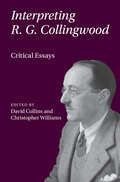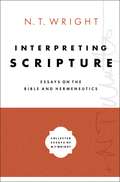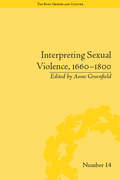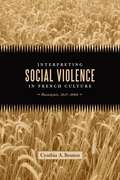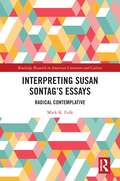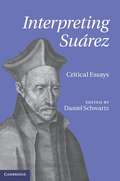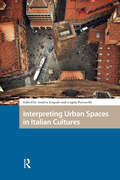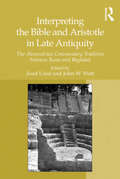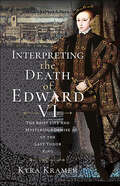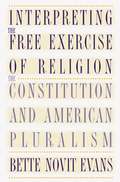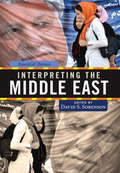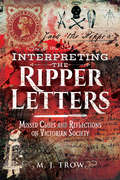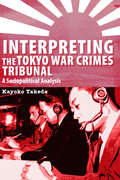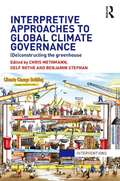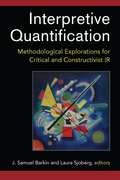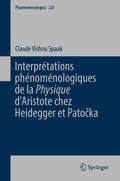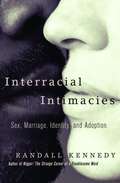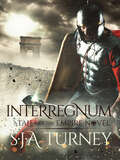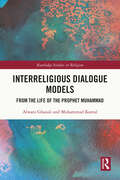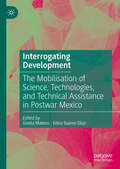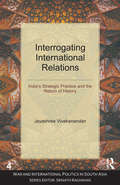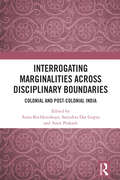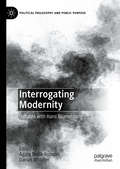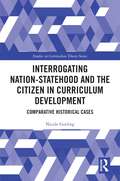- Table View
- List View
Interpreting R. G. Collingwood: Critical Essays
by David Collins Christopher WilliamsAn indisputably prominent figure in twentieth-century philosophy, R. G. Collingwood often remains elusive even to those who admire his achievements. This volume of new essays aims to reintroduce Collingwood to twenty-first-century philosophical readers and to show why, and how, his achievements matter. Each essay offers an original contribution to the understanding of some aspect of Collingwood's thought, including new interpretations of several of his central ideas, re-examinations of his place in twentieth-century philosophy, and an extended consideration of a previously undiscussed manuscript. The essays span the wide range of Collingwood's interests, including metaphysics, epistemology, logic, philosophy of mind, aesthetics, and political philosophy, as well as Roman British history and the history of art. Emphasis is placed on Collingwood's connections to traditions with which his name is not typically linked, including pragmatism, analytic philosophy, and phenomenology. This rich volume will stimulate further examination of Collingwood and his legacy.
Interpreting Schelling
by Lara OstaricThis book is the first collection of essays on Schelling in English that systematically explores the historical development of his philosophy. It addresses all four periods of Schelling's thought: his Transcendental Philosophy and Philosophy of Nature, his System of Identity [Identitätsphilosophie], his System of Freedom, and his Positive Philosophy. The essays examine the constellation of philosophical ideas that motivated the formation of Schelling's thought, as well as those later ones for which his philosophy laid the foundation. They therefore relate Schelling's philosophy to a broad range of systematic issues that are of importance to us today: metaphysics, epistemology, aesthetics, ethics, our modern conceptions of individual autonomy, philosophy of history, philosophy of religion, political philosophy, and theology. The result is a new interpretation of Schelling's place in the history of German Idealism as an inventive and productive thinker.
Interpreting Scripture: Essays on the Bible and Hermeneutics (Collected Essays of N. T. Wright #1)
by N. T. WrightDraws together the most important articles on Scripture and hermeneutics by distinguished scholar and author N. T. Wright. Interpreting Scripture brings together into one volume Wright's self-selected, key lectures, papers, and reflections on topics of scriptural interpretation, including:The Lord's Prayer as a Paradigm of Christian PrayerChristian Origins and the Question of GodFaith, Virtue, Justification, and the Journey to FreedomRevelation and Christian Hope: Political Implications of the Revelation to JohnApocalyptic and the Sudden Fulfilment of Divine Promise…and many more.Interpreting Scripture displays Wright's engaging prose, his courage to go where few have gone, and his joy to bridge the work of the academy and the church. Here is a rich feast for any serious student of the Bible, especially of the New Testament. Detailed, incisive, and exquisitely nuanced exegesis, this collection will reward you with a clearer, deeper, and more informed appreciation of Scripture and its application to Christian life and thought today.Many of the included studies have never been published or were made available only in hard-to-find larger volumes and journals.
Interpreting Sexual Violence, 1660–1800 ("The Body, Gender and Culture" #14)
by Anne GreenfieldThe essays in this collection explore representations of and responses to sexual violence over the course of the long eighteenth century. Contributors examine the underlying ideologies that spawned these representations, confronting the social, political, legal and aesthetic conditions of the day.
Interpreting Social Violence in French Culture: Buzançais, 1847-2008
by Cynthia A. BoutonIn January 1847, a grain convoy passed through Buzançais, an obscure village in a remote region of central France that was suffering from hunger, high prices, and widespread unemployment. Villagers intercepted the shipment, invaded granaries and mills, and forced resale of the grain at a just price set by the people. What started as a classic subsistence movement, however, triggered two days of rioting and class hostility punctuated by uncommon property damage and death. Disorder soon spread throughout the region. The Buzançais riot quickly became an evocative symbol of the rights of the people, and stories about the riot have survived into the twenty-first century. In Interpreting Social Violence in French Culture, Cynthia A. Bouton traces how the production and marketing of the Buzançais riot story served political commentators, publishers, authors, illustrators, and local enthusiasts, enabling them to draw upon key points from the 1847 uprising to negotiate issues relevant to their own times. Bouton argues that over time, especially from the 1970s, the persistent integration of stories of social protest into a widening variety of media has helped shape French political identity as one in which the politics of the street has become as customary as the politics of political assemblies.Bouton examines representations of the riot in newspapers, novels, illustrations, popular and scholarly historical narratives, cartoons, television, local spectacles, and on the Internet. She analyzes power relations embedded in texts and in images; the ways in which texts and images complement, complicate, and contradict each other; and the ways in which history, memory, and fiction intersect. Both in 1847 and subsequently, she shows, efforts to reorder the disorder at Buzançais have exposed aspects of French social and cultural attitudes and practices. She demonstrates that the particular media employed to tell the Buzançais story both constrained and empowered the messages conveyed by textual and visual narratives of it, perhaps as much as the ideological positions of authors, illustrators, or producers. By probing the relationship between medium and story in relation to the Buzançais riot, Interpreting Social Violence in French Culture offers a new interpretation of this defining moment in French history.
Interpreting Susan Sontag’s Essays: Radical Contemplative (Routledge Research in American Literature and Culture)
by Mark K. FulkInterpreting Susan Sontag’s Essays: Radical Contemplative offers its readers a scholarly examination of her essays within the context of philosophy and aesthetic theory. This study sets up a dialogue between her works and their philosophical counterparts in France and Germany, including the works of Hannah Arendt, Jacques Derrida, Roland Barthes, and Walter Benjamin. Artists and concepts discussed in relation to Sontag’s essays include the works of Andy Warhol, Pop Art, French New Wave Cinema, the music of John Cage, and the cinematic art of Robert Bresson, Leni Riefenstahl, Ingmar Bergman, and Jean-Luc Godard. Her aesthetic formalism is compared with Harold Bloom, and this is the first volume to examine her late works and their position within the American events of 9/11/01 and the War on Terror(ism).
Interpreting Suárez
by Daniel SchwartzFrancisco Suárez is arguably the most important Neo-Scholastic philosopher and a vital link in the chain leading from medieval philosophy to that of the Renaissance and the Enlightenment. Long neglected by the Anglo-Saxon philosophical community, this sixteenth-century Jesuit theologian is now an object of intense scholarly attention. In this volume, Daniel Schwartz brings together essays by leading specialists which provide detailed treatment of some key themes of Francisco Suárez's philosophical work: God, metaphysics, meta-ethics, the human soul, action, ethics and law, justice and war. The authors assess the force of Suárez's arguments, set them within their wider argumentative context and single out influences and appraise competing interpretations. The book is a useful resource for scholars and students of philosophy, theology, philosophy of religion and history of political thought and provides a rich bibliography of secondary literature.
Interpreting Urban Spaces in Italian Cultures (Spatial Imageries in Historical Perspective)
by Andrea Scapolo Angela PorcarelliMade up of both material and symbolic elements, the urban space is always dynamic and transitional; it brings together or separates the past and the present, the public and the private, the center and the periphery. The present volume focuses on the interaction between the social processes and spatial forms that shape the identity of Italian cities. Using both canonical and less well-known texts along with cultural artifacts, the essays in the volume deprovincialize the Italian city, interpreting the material and symbolic practices that have made it into a unique entity whose enduring influence extends far outside Italy.
Interpreting the Bible and Aristotle in Late Antiquity: The Alexandrian Commentary Tradition between Rome and Baghdad
by Josef LösslThis book brings together sixteen studies by internationally renowned scholars on the origins and early development of the Latin and Syriac biblical and philosophical commentary traditions. It casts light on the work of the founder of philosophical biblical commentary, Origen of Alexandria, and traces the developments of fourth- and fifth-century Latin commentary techniques in writers such as Marius Victorinus, Jerome and Boethius. The focus then moves east, to the beginnings of Syriac philosophical commentary and its relationship to theology in the works of Sergius of Reshaina, Probus and Paul the Persian, and the influence of this continuing tradition in the East up to the Arabic writings of al-Farabi. There are also chapters on the practice of teaching Aristotelian and Platonic philosophy in fifth-century Alexandria, on contemporaneous developments among Byzantine thinkers, and on the connections in Latin and Syriac traditions between translation (from Greek) and commentary. With its enormous breadth and the groundbreaking originality of its contributions, this volume is an indispensable resource not only for specialists, but also for all students and scholars interested in late-antique intellectual history, especially the practice of teaching and studying philosophy, the philosophical exegesis of the Bible, and the role of commentary in the post-Hellenistic world as far as the classical renaissance in Islam.
Interpreting the Death of Edward VI: The Brief Life and Mysterious Demise of the Last Tudor King
by Kyra KrammerKing Edward VI tends to be glossed over in the historical narrative of the Tudor dynasty. His achievements during his brief time on the throne are eclipsed by the tumultuous and fascinating reigns of his grandfather, father and two half-sisters. This does a great disservice to the precocious and remarkable boy-king. Even with his early death, his effect on English history is undeniable - if he had lived, he would have almost certainly have been considered the greatest of the Tudor monarchs. What killed this impressive young man before he could deepen his mark on history? Moreover, is that medical mystery connected to the premature deaths of the other Tudor male heirs? Interpreting the Death of Edward VI is an exploration into the life, illness and unusually early death of Henry VIII's overshadowed son. The author uses her expertise in Tudor medical history to investigate and provide an in-depth analysis of the prevailing theories of what might have killed the otherwise healthy young Tudor before he reached adulthood.
Interpreting the Free Exercise of Religion
by Bette Novit EvansA generation ago, all of the big questions concerning religious freedom in America seemed to have been resolved. At the very least, the lines of division between proponents of a wall of separation between church and state and advocates of religious accommodation seemed clearly drawn. Since then, increasing religious diversity and changing functions of government have raised new questions about what it means to allow the free exercise of religion. In this book, Bette Novit Evans explores the contemporary understandings of this First Amendment guarantee in all of its complexity and ambiguity. Evans situates constitutional arguments about free exercise within the context of theological and sociological insights about American religious experience. She surveys and evaluates several of the most well considered approaches to religious freedom and applies them to contemporary legal controversies, examining problems in defining religion and claims concerning the autonomy of religious institutions. Her conclusions about religious liberty are embedded in an appreciation of American pluralism: the guarantee of religious freedom, she argues, can be understood as an instrument for fostering alternative sources of meaning within a pluralistic political community.
Interpreting the Middle East: Essential Themes
by David S. SorensonContemporary approaches to comparative studies of the Middle East increasingly recognize how globalization and regional mass communication have blurred differences across countries. <P><P>Populations travel across national borders and compare narratives about political change, economic futures, and the role of the outside world in shaping their lives. Organized by five principal themes of a regional overview, politics, economic development, social context, and international issues, Interpreting the Middle East provides a vibrant introduction to the Middle East that is compatible with this regionalist perspective. Invited authorities contribute insightful and accessible original discussions of central headline-fresh issues such as the aftermath of the Iraq war, Iran's regional ambitions, developments in the Israeli'Palestinian conflict, and the global politics of Middle East oil, gender, and religion. Section introductions by the editor integrate the contributions, and suggested readings, a glossary, and a biographical list of key persons provide helpful guidance for readers.
Interpreting the Ripper Letters: Missed Clues and Reflections on Victorian Society
by M. J. TrowThis true crime history examines the media frenzy surrounding Jack the Ripper—and what the so-called Ripper Letters reveal about Victorian society. In the autumn of 1888, a series of grisly murders took place in Whitechapel in London&’s East End. The Whitechapel murderer, arguably the first of his kind, was never caught, though the police and local press received hundreds of letters claiming to be from the killer. Though most if not all of these letters were hoaxes, they gave rise to the best known pen-name in criminal history: Jack the Ripper. Some letters were taken more seriously than others, while a few—such as the infamous &“Dear Boss&” letter—sent thousands on a hunt to follow its clues. This book is not about the world&’s first serial killer but about the twisted souls who played the part on paper, implicated innocent men, or suggested ever more lurid ways in which he could be caught. For true crime historian M.J. Trow, these letters offer a window into the disturbing shadows of the Victorian mind.
Interpreting the Tokyo War Crimes Tribunal: A Sociopolitical Analysis (Perspectives on Translation)
by Kayoko TakedaIn order to ensure its absolute authority, the Tokyo War Crimes Tribunal (1946–1948), the Japanese counterpart of the Nuremberg Trial, adopted a three-tier structure for its interpreting: Japanese nationals interpreted the proceedings, second-generation Japanese-Americans monitored the interpreting, and Caucasian U.S. military officers arbitrated the disputes. The first extensive study on the subject in English, this book explores the historical and political contexts of the trial as well as the social and cultural backgrounds of the linguists through trial transcripts in English and Japanese, archival documents and recordings, and interviews with those who were involved in the interpreting. In addition to a detailed account of the interpreting, the book examines the reasons for the three-tier system, how the interpreting procedures were established over the course of the trial, and the unique difficulties faced by the Japanese-American monitors. This original case study of the Tokyo War Crimes Tribunal illuminates how complex issues such as trust, power, control and race affect interpreting at international tribunals in times of conflict.
Interpretive Approaches to Global Climate Governance: (De)constructing the Greenhouse (Interventions)
by Delf Rothe Benjamin Stephan Chris MethmannGlobal climate change is perceived to be one of the biggest challenges for international politics in the 21st century. This work seeks to fuse a global governance perspective together with different interpretive approaches, offering a novel way of looking at international climate politics. Equipped with a common interpretive tool-kit, the authors examine different issue-areas and excavate the contours of an overall pattern – the depoliticisation of climate governance. It is this concept which represents the overarching theme connecting the different contributions, addressing issues such as how the securitization of climate change conceals its socio-economic roots; how highly political decisions and value-judgements are couched in the terms of science; how the reframing of climate change as a matter of economic calculation and investment narrows the scope of political action; and how the prevailing concentration on technological solutions to climate change turns it into a mere administrative issue to be tackled by experts. Highlighting the depoliticisation of highly political issues provides a means to bring the political back into one of the most important issue areas of 21st century world politics. The editors have assembled a series of 14 interpretive inquiries into discourses of global climate governance which aim to flesh out an interpretive methodology, demonstrating the value it offers to those seeking to achieve a better understanding of global climate governance. This work will be of great interest to students and scholars of environmental politics, political theory and climate change.
Interpretive Quantification: Methodological Explorations for Critical and Constructivist IR
by J. Samuel Barkin Laura SjobergCountering the growing divide between positivists who embrace quantitative, numerical approaches and post-positivist scholars who favor qualitative, interpretive approaches, J. Samuel Barkin and Laura Sjoberg argue that both methods are more widely adaptable than is commonly assumed by either camp. In Interpretive Quantification, ten highly regarded scholars in the field of International Relations apply quantitative methods and formal models to specific constructivist and critical research questions. In this way, each chapter serves not only as evidence that methods can productively be applied across paradigms, but also as a guide as to how this may be done. In sum, the contributors make a compelling case that when researchers cordon off particular methods for merely ideological reasons, they circumscribe their own paradigms and hinder their own research agenda.
Interprétations phénoménologiques de la 'Physique' d’Aristote chez Heidegger et Patočka (Phaenomenologica #223)
by Claude Vishnu SpaakCet ouvrage met en œuvre une confrontation philosophique entre Heidegger et Patočka, deux figures majeures de la tradition phénoménologique, en prenant pour fil conducteur leurs interprétations respectives des concepts fondamentaux de la Physique d’Aristote. Mais tout d’abord, le point d’accord : l’herméneutique de l’aristotélisme représente aux yeux de Heidegger et de Patočka une première entrée pensante dans l’affaire même de la pensée, où le mouvement (κίνησις/μεταβολή), irréductible au déplacement d’un étant dans l’espace, désigne le procès d’advenue au paraître qui sous-tend l’éclosion à l’être des choses. Aristote met au jour la différence ontologique entre l’être et l’étant, en sorte que la Physique constitue de ce point de vue pour Heidegger et Patočka le véritable Grundbuch de la philosophie occidentale. Cependant, Heidegger et Patočka ne comprennent pas de la même manière le sens de ce mouvement ontologique au cœur de l’être (φύσις). À travers l’examen de ces différences, l’enjeu de cet ouvrage est de mettre en évidence un point de tension au sein de la phénoménologie qui n’a pas encore été suffisamment remarqué, entre d’une part l’approche heideggérienne qui soumet l’être au sens (λόγος), et s’expose de la sorte au risque d’un anthropocentrisme ontologique larvé. Et d’autre part, la tentative d’un réalisme phénoménologique, dont Patočka fut l’un des représentants, dans la double mesure où il brise l’identité classique de l’être et de l’intelligibilité, et où il pense l’homme comme radicalement décentré, prétendant en finir ainsi avec le sujet et tous ses avatars (c’est là le sens de la fameuse « phénoménologie asubjective ») ; réalisme radical dont on peut toutefois se demander s’il ne met pas à mal le paradigme phénoménologique de l’a priori de la corrélation entre l’apparaître et ses modes subjectifs de donnée, et s’il ne remet pas en cause ainsi la possibilité même de la phénoménologie en la poussant au-delà de sa propre limite.
Interracial Intimacies: Sex, Marriage, Identity, and Adoption.
by Randall KennedyAnalyzing the tremendous changes in the history of America's racial dynamics, Kennedy takes us from the injustices of the slave era up to present-day battles over race matching adoption policies, which seek to pair children with adults of the same race. He tackles such subjects as the presence of sex in racial politics, the historic role of legal institutions in policing racial boundaries, and the real and imagined pleasures that have attended interracial intimacy. A bracing, much-needed look at the way we have lived in the past, Interracial Intimacies is also a hopeful book, offering a potent vision of our future as a multiracial democracy.
Interregnum (Tales of the Empire)
by S.J.A. TurneyThe Empire has fallen. The Empire must rise.For twenty years civil war has torn the Empire apart; the Imperial line extinguished after the mad Emperor Quintus was burned in his palace, betrayed by his greatest general and oldest friend, Kiva Caerdin.Against a background of war, decay and violence, men who once served in the proud Imperial army now fight as hands for hire, fodder for greedy lords fighting over the remnants of more glorious times. Kiva’s memories of the Empire are reignited when fighting alongside a fearsome mercenary unit, the Grey Company. Forced to face a dark and shameful past, he struggles to achieve redemption, and defeat an ancient, cunning and bitter rival. Only then can the Empire be unified... and reborn.A historical fantasy of valour, honour, and determination against all odds,Interregnum is the first novel in S.J.A. Turney’s epic Tales of the Empire series, perfect for readers of Conn Iggulden, Bernard Cornwell and Simon Scarrow.
Interreligious Dialogue Models: From the Life of the Prophet Muhammad (Routledge Studies in Religion)
by Muhammad Kamal Alwani GhazaliHow did the Prophet Muhammad (pbuh) converse and engage with other religious believers? Did he start off with prejudice and mistrust? Or was he convivial and open-minded? This book analyses six models of the dealings in the lifetime of the Prophet Muhammad (pbuh), specifically, but not restricted, to the siblings of Abrahamic religious believers. The six models of dialogue analysed in the book are dialogue with Ashamah, Najashi of Abyssinia, delegation of Najran Christians, different Jews of Yathrib, and emperors of Byzantine and Sassanid. The analysis applies Ibn Khaldun’s (d.1406) historical approach which the author termed as Khaldunian Hermeneutics due to the similarity between his ideas to that of Johann Gustav Droysen (d. 1884), a German philosopher, in historical hermeneutics. As such, the analysis goes beyond the dialogue content, taking into consideration the immediate and larger contextual settings, and changes of the contexts due to the passage of time. It critically considers the suitability of each model due to the difference in times and contexts. The book serves as a reference for Muslim dialogue advocates and practitioners, to provide substantial evidence of the dialogue application by the role model of Muslims – the Prophet Muhammad (pbuh) whom they hold very dear to their hearts.
Interrogating Development: The Mobilisation of Science, Technologies, and Technical Assistance in Postwar Mexico
by Gisela Mateos Edna Suárez-DíazThis volume explores the diverse meanings and ways of implementing development programs and technical assistance projects, through several case studies grounded in Mexico but transcending its geography. Despite – or perhaps because of – claims of &“revolutionary nationalism&”, Mexico played a crucial international role during the decades following World War II, both by challenging and enacting developmentalist models, values, and projects that stressed national priorities, resonating beyond its borders and even outside Latin America. Energy, irrigation, communication infrastructures, nuclear technologies, public health, and patents, are meaningful examples explored in this volume of the mobilisation of science and technologies understood in a broad sense, including not only the natural and social sciences, but also bureaucratic technologies that accompanied infrastructural and industrial projects. These case studies interrogate the specific agents and mechanisms of technical assistance put to work to meet local priorities, which in turn required and informed different international models and ideas of development.
Interrogating International Relations: India's Strategic Practice and the Return of History (War and International Politics in South Asia)
by Jayashree VivekanandanThe book interrogates the disciplinary biases and firewalls that inform mainstream international relations today, and problematises the several tropes that have come to typify the strategic histories of post-colonial societies such as India. Questioning a range of long-held cultural representations on India, the book challenges such portrayals and underscores the centrality of context and contingency in any cultural explanation of state behaviour. It argues for a historico-cultural understanding of power and critiques IR’s tendency to usher in a selective ‘return of history’. Taking two contrasting case studies from medieval Indian history, the book assesses the success and failure of the grand strategy pursued by the Mughal empire under Akbar. The study emphasises his grand strategy of accommodation, defined by the interplay of critical variables such as distance and the vast military labour market. The book also looks at his conscious attempt to indigenise power by projecting himself as the personification of the ideal Hindu king. This case study helps to contextualise the many critical transitions that occurred in international relations: from medieval empires to the modern state system, and from an indigenised, experiential understanding of power to its absolute, abstract manifestations in the colonial state.
Interrogating Marginalities across Disciplinary Boundaries: Colonial and Post-Colonial India
by Amit Prakash Sanjukta Das Gupta Anna BochkovskayaThis volume adopts an interdisciplinary approach to rethink the multiple dimensions of marginality – political, societal, economic, cultural, legal and spatial. It explores their new representations in colonial and post-colonial India. Departing from extant analyses of experiences of marginalization in diverse social groups, it proposes to problematize the conceptualization of marginality, focusing on its evolution through space and time. A relational position, marginality, it is argued, presupposes a confrontation with centrality or the ‘mainstream’ within a common discourse of knowledge and power. The volume emphasizes that the process of marginalization is not a ‘marginal’ phenomenon and draws attention to the historical processes which determine, establish and perpetuate the margins.The book reflects on varied aspects of evolving marginalities – structural, cultural and psychological – in South Asia in diverse temporal, spatial or societal contexts. It examines the discourses, institutional mechanisms and economic processes within which marginalities are located. This work will be an important read for scholars and researchers of history, anthropology, subaltern studies, exclusion studies, South Asian history, post-colonial studies, political studies, Indian history, cultural studies and history, in general.
Interrogating Modernity: Debates with Hans Blumenberg (Political Philosophy and Public Purpose)
by Daniel Whistler Agata Bielik-RobsonInterrogating Modernity returns to Hans Blumenberg's epochal The Legitimacy of the Modern Age as a springboard to interrogate questions of modernity, secularisation, technology and political legitimacy in the fields of political theology, history of ideas, political theory, art theory, history of philosophy, theology and sociology. That is, the twelve essays in this volume return to Blumenberg's work to think once more about how and why we should value the modern. Written by a group of leading international and interdisciplinary researchers, this series of responses to the question of the modern put Blumenberg into dialogue with other twentieth, and twenty-first century theorists, such as Arendt, Bloch, Derrida, Husserl, Jonas, Latour, Voegelin, Weber and many more. The result is a repositioning of his work at the heart of contemporary attempts to make sense of who we are and how we’ve got here.
Interrogating Nation-Statehood and the Citizen in Curriculum Development: Comparative Historical Cases (Studies in Curriculum Theory Series)
by Nicole GotlingThis book dives into the histories of nation-state-building and curriculum formation to explore the ways that they intertwine, form and inform each other.This book follows the understanding that nation-states have – and still do – develop their educational institutions, curricula, and teaching materials with specific goals and with a specific idea of the ideal student and citizen they want to create in mind. In particular, it advocates that analyzing multiple, idiosyncratic cases can inform the connection between what we learn, how we learn it, and who we become as citizens and further, that this is related not to linear or global phenomena, but to particular nation-states, curricula, and time periods. This book focuses on the comparison between four cases during the time of the large, map-changing events and period of the Prussian Wars (1864–1871) to make the intertwined relationships between nation-states and their curricula, designed to create future loyal citizens, more apparent. It makes a point of reconstructing each of the nation-states' historical national-political and educational processes, and then the reconstructed trajectories are compared both in their own trajectories over time throughout the 19th century and up until World War II and in relation to other nation-states' trajectories over the same long timespan.Exploring a new pathway into research on the intersection of education, curriculum, and nationalism and providing a new, extensively researched and formed methodological framework, it will appeal to researchers, academics, and postgraduates with interests in comparative and international education, curriculum studies, the history of education, nationalism, state-building, and textbook analysis.
